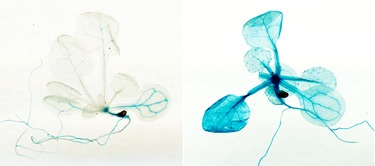Menu
Response to environmental stresses
Environmental abiotic stresses, such as cold, drought, and high salinity, can greatly affect plant growth and development. Plant scientists have faced increasingly challenging climate changes to maintain and increase the food production in the world. Due to their sessile nature, plants have to develop special systems to respond and adapt to stresses and ultimately acquire stress tolerance for survival. Thus, understanding mechanisms for stress adaptation and tolerance is one of the most important and challenging goals in plant sciences and holds the key for future plant breeding. One of our main ongoing research projects is to identify plant “enhancers” that regulate expression of genes activated by abiotic stresses. Enhancers are cis-regulatory DNA elements that control the expression of genes during specific developmental stages or under various biotic and abiotic stresses. Enhancers can be identified based on their unique molecular signatures associated with open chromatin (2021, Plant Cell 33: 1997-2014). Identification and characterization of stress-responsive enhancers will be essential for us to understand plant stress biology, such enhancers will also become a key resource to improve the tissue specificity and transcription levels of transgenes for crop improvement.
